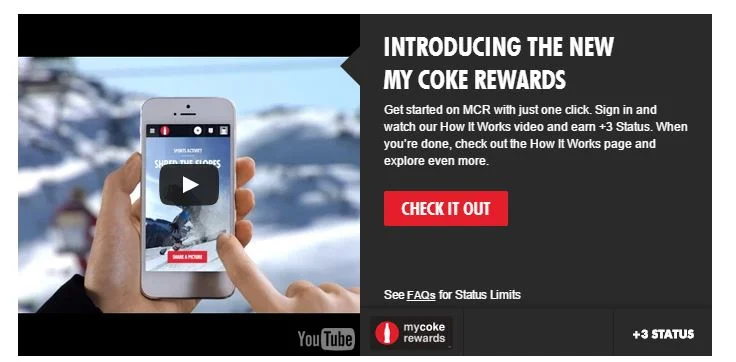Do I need a copywriter or a content writer? Is there a difference?
Is it copy or content?
I've been asked this so many times. In fact, I just saw someone ask this question in a copywriting forum on Facebook. Some writers don't even know the difference!
I've written articles about it for other websites, but I thought I should probably lay down the knowledge here, too. Let's get started.
The Difference Between Copywriting and Content Writing...In a Nutshell
There's probably going to be arguments about this. Some people feel that content and copywriting are the same thing, but it really isn't in my opinion. Here's the low-down:
Copy is marketing writing that does nothing but sell, like an ad or a marketing email. Content sells and/or informs or entertains.
Let's look at some examples.
Copywriting from the Coke website.
This example from the Coke Rewards website is simple copywriting. The whole goal of the text is to get visitors to sign up for Coke's new reward program so Coke can sell more soda. That's it.
This text is by the same company, but it is classified as content instead of copy.
This text is also presented by Coke. It's sole objective is to tell visitors about the mission and vision of the company. While its overall purpose is to convey a positive feeling about the Coca-cola corporation, it also informative. A kid who is writing a school paper about Coke could go to this page and be supplied with facts about the company's mission. This makes the text content.
What you're reading right now is content, by the way. The text on this page of my site, though, is copy.
Do You Need to Hire a Copywriter or a Content Writer?
You can take this quick test to decide whether you need to hire a copywriter or a content writer.
If you answer yes to these questions, you need a content writer:
Does the text need to draw in traffic?
Will the text be informative or used to engage the visitor?
Will this text be shareable?
If you answer yes to these questions, you need a copywriter:
Is the intent of this text to sell?
Will the content have a call-to-action?
Will the content be used for direct mailings, sales emails, homepages or social media?
What if you need both? What if you need copy and content? Well, there are writers that do both types of writing very well. For example, I've written copy and content for big and small companies and they have been very happy with the results.
What's the Difference Between Journalism and Content Writing?
Paid news isn't ethical. Don't get greedy.
There's one more type of writing I think I should talk about before I close out this post: journalism. Business owners tend to get news and content writing confused. A news article is one that excludes bias towards a business, product or person. So, if you are paying a writer to create a news article about your business to be published in a magazine or newspaper, that's unethical.
Think about this scenario:
A business owner contacts a journalist that writes for a print or online newspaper or magazine and asks if the writer would do an article about the business. The business promises to pay the writer for an article or a mention. The writer agrees and the article is published.
A totally legit transaction, right? NOPE. This is an incredibly shady practice.
A news article is defined as written content that excludes bias towards a business, product or person. If the writer is being paid by a business, there's no way the article isn't biased.
Most, if not all, news publications have rules about this sort of thing. As a writer, taking a payment is a great way to get fired and have your name smeared from here to eternity.
(For everyone about to leave a comment about big media: I'm not naive enough to think that money never exchanges hands in journalism, but that doesn't mean it's okay.)
If your business has a newsworthy story then you shouldn't have to pay for news coverage. A publication will want to cover your story. Plus, a publication writer is already getting paid from their publication. If they get paid by the business and the publication they're just double-dipping.
The exception to this rule is blogging. Independent bloggers don't get paid by a publication and may require payment to cover your business. This is called a sponsored post.
Okay, so that's your three basic types of text that can be found online and in print.





